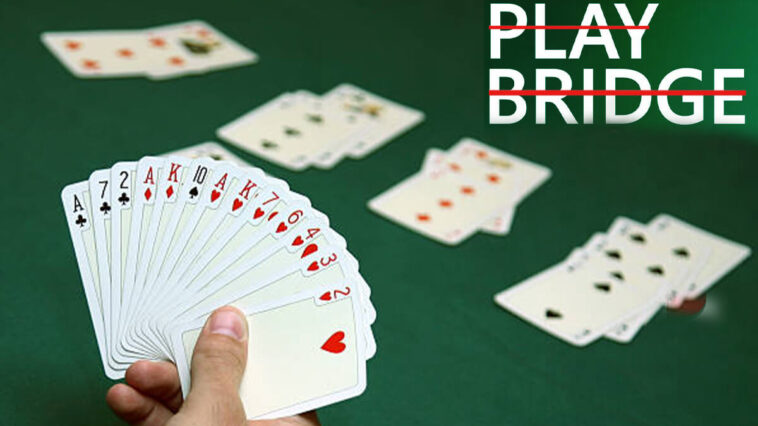Contract bridge, also simply known as bridge, is a popular skill-based card game. In fact, millions of people play bridge around the world on a daily basis.
Given the popularity of contract bridge, you might expect to see it available in casinos. However, this isn’t the case at all.
No casino offers bridge tables on a regular basis. Those that do feature this game only do so for promotional purposes.
Why is it that casinos don’t provide this game regularly despite its popularity? The following guide explains what casinos look for in games and why bridge doesn’t live up to these standards.
Basics of Bridge
Before getting into the details on why casinos don’t like contract bridge, I’m going to discuss the basics of this game. Of course, if you’re an experienced bridge player, then you can certainly skip this section.
2 Main Variations of Contract Bridge
Contract bridge is a broad term that encompasses several variations of this game. The two most-popular variants are Duplicate and Rubber Bridge.
The latter is common as a home game and is sometimes available in card clubs or tournaments. Duplicate Bridge, meanwhile, is mainly reserved for clubs and tourneys.
These two games share many similarities. The Duplicate version, however, removes the random luck element by judging who plays the exact same hand the best. For the purposes of this post, I’ll cover Rubber Bridge due to how many players like the randomness of the draw.
Four Players, Two Teams
Bridge is much like Spades and Hearts in that it involves four players, split up into two teams. Teammates sit across from each other.
Bridge uses a standard deck with 52 cards. Each player takes a turn dealing, moving in a clockwise manner. Every player will have 13 cards when the deal is finished.
Bidding
Players bid on how many hands/tricks their team can win in a round. Bidding automatically starts at 6 tricks and moves clockwise. A bid of 2, for example, means that a team thinks they can win 8 tricks. The maximum bid is 7 when accounting for how only 13 tricks/hands can be played (52/4).
The bidding process also involves each team choosing a trump suit. A team that bids 3/diamonds, for instance, is declaring that they can win 9 tricks and diamonds would be the trump suit.
When two bids tie, the suit determines the winning bid. Suits ranked from highest to lowest include:
- Clubs
- Diamonds
- Hearts
- Spades
“No trump” is another option when bidding. It simply refers to a bid where no suit will trump another during the round.
Players can also pass when it’s their turn to bid. The winning bidder (a.k.a. declarer) is determined when three consecutive players exercise their pass option.
The team with the successful bid must win at least as many tricks as their bid indicates. Meanwhile, the defending team needs to prevent their opponents from reaching the bid amount.
Playing Hands
Once the bidding is over, the declarer’s teammate (a.k.a. the dummy) turns their entire hand ace-up. The dummy doesn’t play any cards from their hand during the round. Instead, the declarer chooses from among the face-up cards when it would otherwise be the dummy’s turn.
The player to the declarer’s left lays down the first card of a new round. They can use any card from their hand. Play continues in a clockwise manner.
Players Must Play the LED Suit if Possible
Assuming a diamond is laid down first, then everybody must play a diamond if they have one. When a player doesn’t have the led suit, then they can use any card from their hand.
Normally, the highest card from the led suit wins. However, it can be beaten by any card from the trump suit.
The only card that beats a trump suit is a higher trump card.
Here’s an example:
- The trump suit is clubs.
- The led suit is hearts.
- One player lays down an ace of hearts.
- Another player lays down a 3 of clubs.
- The 3 of clubs will win, provided no higher trump cards are played.
Once a player wins a trick, they collect the four cards and place the trick face-down near them. The idea is to keep these tricks separate but in front of the given player, thus making all winning tricks easier to count.
When the next hand begins, the winner from the previous trick lays down the first card. This process continues until every card has been dealt (13 tricks total).
Scoring
Once a game is over, players tally the points. If the declarer’s team wins, they receive points as follows:
- 20 points for each trick won (past six) if the trump suit is clubs or diamonds.
- 30 points for each trick won (past six) if the trump suit is hearts or spades.
- 40 points for the first trick won (past six) if there’s no trump suit.
- 30 points for every subsequent trick won (past six) if there’s no trump suit.
Points accrued for successful bids are considered “below the line.” The first team to score 100+ points below the line wins a single game. A partnership wins “the Rubber” when they take two games.
However, the Rubber winner isn’t necessarily the match winner. Overall points determine who wins the entire match.
As explained before, below-the-line points are based on the amount of tricks won and the given trump suit. The Rubber winner collects additional points “above the line.”
Teams can also lose points when they fail to reach a contract bid. They’ll lose 50 points for failing on the contract if they’ve yet to win a game. They’ll lose 100 points when coming off a win and failing to meet the bid.
Once the Rubber game has been won, points above and below the line are added up. The winning partnership is the one with the most points.
Where Can You Play Bridge?
Despite its virtual nonexistence in casinos, bridge is still available in a number of places. Community centers, senior centers, and some card clubs offer this game.
Contract bridge experienced a boom in the mid-1900s thanks to its heavy skill element. Many of its biggest fans are older, hence why the game is common in senior centers and retirement homes.
Of course, bridge players exist in many age groups. Younger players often like to start games at home, which is no doubt the easiest way to play.
That said, you can play contract bridge anywhere as long as you have four people. Of course, if you want to play for serious money, then you’ll need to compete in a major tournament or visit a relevant card club.
As mentioned before, casinos occasionally offer bridge as a promotion. They may hold a tournament with a large prize pool to attract gamblers.
Again, though, they only stage these events as a promotion. Casinos don’t run contract bridge tables on a consistent basis.
What Factors Do Casinos Consider When Choosing Games?
Gambling establishments can’t just throw any game on the floor and expect to get action. Instead, they must carefully consider each game they offer for profit purposes. Here are the main points that gaming venues look at when deciding what goes on their floors.
House Edge
The casino needs to make money somehow when offering games. After all, they must pay for dealer salaries, utilities, and gaming equipment.
Therefore, they maintain an advantage with anything that they provide. Of course, the house edge varies from one game to the next.
Baccarat For Example:
This game only features a 1.06% house advantage with the banker bet. The player wager is also respectable with a 1.24% house edge.
Slot machines, on the other hand, give the casino a larger advantage. These games generally carry anywhere from a 4% to 10% house edge. The latter range is more common in Las Vegas casinos.
In any case, gambling establishments need guaranteed profits over time. The house advantage provides these guaranteed winnings. If a game doesn’t deliver notable profits, then casinos aren’t interested.
Will Gamblers Play Against the Given House Edge?
Theoretically, gaming venues could offer a bunch of games with 50% house edges. Such advantages would bring them immense profits.
It wouldn’t be long, though, before gamblers caught on that they were getting a raw deal. Soon, nobody would visit casinos that offered these games.
The gaming industry must strike a balance between making money and giving players a chance to win. Some games, like real money baccarat and blackjack, need a lower house edge to draw gamblers.
Others, such as slot machines and American roulette, can still attract people despite offering less-favorable chances of winning.
Of course, not everybody pays attention to their odds when picking casino games. This is a big reason why slots are so popular. Other players, though, demand a better chance of winning—hence the need for high-paying table games.
Rate of Play
Casino games with the lowest house edges usually play faster than other games. Mini baccarat is a perfect example of this case. Again, its best bet only carries a 1.24% house advantage.
Assuming baccarat only saw 40-50 hands per hour, then it wouldn’t be worthwhile to casinos. However, it actually sees between 100 and 200 hands an hour, which allows casinos to better capitalize on their edge.
Craps and roulette, in contrast, do only see 40 to 50 rounds per hour. But these games also allow players to make multiple bets per round. Some of the craps prop bets feature particularly high house edges, which also helps make up for the slow play rate.
Why Doesn’t Bridge Fit In at Casinos?
Bridge doesn’t fit into what casinos are trying to accomplish in any way. From the casino’s perspective, this game has the following downsides:
- It doesn’t provide a house advantage.
- It plays at a slow rate.
- Casinos would need to charge considerable rake to make bridge profitable.
Bridge is just like poker in that it’s a player-vs-player game. When played amongst friends, all of the winnings go to the players.
Of course, casinos could still offer this game and take rake. They do so with poker, collecting around 5% from each cash-game pot and 10% from tournament entry fees.
However, bridge plays at such a slow rate that even the rake wouldn’t be enough to earn casinos any money. Games can take a long time to finish.
That said, gaming establishments would need to force gamblers to play higher stakes or collect significant rake. In either case, casinos would be turning off a large portion of bridge fans.
Bridge Is Best As a Player vs Player or Club Game
The good news is that you don’t have to rely on casinos to offer contact bridge. Instead, you can start a game up with a few of your buddies.
As mentioned before, you don’t have to pay any rake amongst friends. Furthermore, you can get a game going at any time and don’t need to wait for the casino’s open hours.
Assuming you want to get out and play against unfamiliar opponents, you can visit a card club or anywhere else that offers this game.
Some card clubs feature bridge tournaments. Senior centers and retirement homes provide games free of charge.
Conclusion
For the reasons explain before, bridge isn’t a profitable game for casinos and online casino sites. That said, they don’t regularly offer contract bridge tables.
The one time that a casino might offer bridge is when they’re running a promotion. For example, they may feature a bridge tournament with entry fees and a prize pool.
However, casinos only run these events to attract new potential gamblers. They’re hoping that these bridge players eventually filter to slot machines, roulette tables, or any other game.
They’re not expecting to make a big profit off these tourneys. In fact, casinos may be willing to take a loss on bridge tournaments so long as they get lots of play on other games. Other than promotions circumstances, though, don’t expect to see contract bridge in gaming venues.
Michael Stevens
Michael Stevens has been researching and writing topics involving the gambling industry for well over a decade now and is considered an expert on all things casino and sports betting. Michael has been writing for GamblingSites.org since early 2016. …





